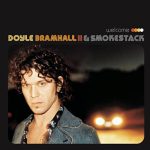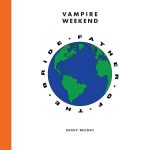
BIG THIEF, U.F.O.F. (CD/LP)
Over the course of their previous two albums, New York foursome Big Thief pruned their meaty alt-rock back into mellow indie. UFOF sees them pare things down further still, in a collection of gentle folk that seems dazed by its own exquisite beauty. Sometimes, the results bring to mind a sugar-coated Elliott Smith: acutely lovely melodies are layered over beds of softly hypnotic guitar, the finger-picked figures gratifyingly soporific in their apparent capacity to continue for ever. At others, the band channel a kind of diluted, Americana-tinged pop, buoyed along by its own breathy charm. Yet UFOF is also careful to temper its prettiness and prevent it from becoming cloying: unsurprisingly for a record that references alien objects in its title (the F stands for “friend”), this is an album that is awash with uneasy wonder. Vocalist Adrianne Lenker paints portraits of people and places with a woozy impressionism that could make even the most banal of domestic scenes sound like a close encounter with aliens. To unsettle things further, she warps her voice, pitching up from its default – bewitchingly fine to the point of frailty – into a shrill, shuddering vibrato (Orange), or descending into a cold, throaty croon (Betsy), with a subtlety that renders its shapeshifting form all the more eerie. Occasionally, the production lends a hand – Jenni features a spectral false start, a brief burst of song replaced by whining feedback like the uncertain first glimpse of a horror-movie ghoul, while on the title track, Lenker’s voice is chopped and distorted until she embodies the extra-terrestrial life form the lyrics allude to. Now and then, the band delve back into their previous, less rarefied styles: during the finale of opener Contact, which flowers into a grunge nightmare fashioned from beefy riffs and screaming feedback, or on Jenni’s swelling, shoegaze chorus. Those diversions create moments of gut-wrenching contrast, making hackneyed rock tropes feel surprising again – proof that with this softening of their sound, Big Thief have alighted upon something that packs a real punch.

DOYLE BRAMHALL II & SMOKESTACK, Welcome (CD/LP)
Doyle Bramhall II steps out on his own with his band Smokestack on Welcome, the Austin-based singer-guitarist-songwriter’s second album for RCA. A collection of hard-hitting, old-school rock numbers like “Green Light Girl” (reminiscent of Jimi Hendrix’s “Fire”), “So You Want It to Rain” (a Blind Faith-ish anthem), “Problem Child” (a kind of SRV meets James Gang vibe) and “Soul Shaker” (see the Stones’ “Street Fighting Man”) and “Helpless Man” (a groove shamelessly lifted from the Beatles’ “Come Together”), there is nevertheless an undercurrent of blues here that comes across ever-so-slightly in Bramhall’s guitar work and vocal phrasing (particularly on the Muddy-influenced “Smokestack”). But make no mistake: file this one under rock rather than blues-rock.

VAMPIRE WEEKEND, Father Of The Bride (CD/LP)
Six years ago, as Vampire Weekend released their last album, frontman Ezra Koenig reflected on their progress. “If people could look at our three albums as a bildungsroman,” he told the New York Times, “I’d be OK with that.” On one level, of course alt-rock’s premier chroniclers of preppy romance and wordy middle-class angst would start chucking 19th-century German literary terms around when asked to consider their oeuvre. On the other, Vampire Weekend’s first three albums did feel like a trilogy, covering a life from studenthood to late-twentysomething dread. Koenig’s remark implied that his band would move on to different territory, which brings us to Father of the Bride, an album that comes in a sleeve that looks like a home-made banner at a climate-change protest and that seems to fix its gaze a little wider than the manicured lawns of moneyed upstate New York, or the inside of a brain suddenly gripped by adult pressures and fears of mortality. It deals with many topics that have exercised songwriters of late, from the noise of social media and its bubbles to the rise of populist politics, and does so with an elegant turn of phrase: “Why’s it felt like Halloween since Christmas 2017?” It concludes with a song (Jerusalem, New York, Berlin) that ponders the Balfour declaration and the creation of Israel, albeit in vague terms. But the biggest shifts on Father of the Bride are musical, rather than lyrical. Its 18 tracks seem to belong in an august tradition begun by the Beatles’ eponymous 1968 release: the double album not as grandiose conceptual statement, but a crowded, loose scrapbook of ideas, not all of them fully baked. It’s underlined by the fact that the sound is frequently muffled or swathed in hiss, as if you’re listening to an old cassette of off-the-cuff recordings rather than an album graced by the presence of big-name producers who have worked with U2, Carly Rae Jepsen and Justin Bieber between them. In fact, Father of the Bride does a lot of White Album-ish things: songs crash into each other, or are separated by snatches of studio dialogue, or die away to be replaced by the sound of tweeting birds. There are tracks that sound more like unfinished interstitials than songs. There are unexpected stylistic lurches into pre-war pop: the beautifully mournful piano ballad My Mistake has a distinct air of the great American songbook. There’s country and western, too, the latter a rather surprising tack for representatives of the opposite end of the musical spectrum towards earthy blue-collar simplicity. And yet, here they are, employing a pedal steel player and duetting with Danielle Haim on a song called Married in a Goldrush that sets a distinctly Nashville tune against chattering electronics.
THE DREAM SYNDICATE, These Times (CD/LP)
JUDAH & THE LION, Pep Talks (CD/LP)
BAD RELIGION, Age Of Unreason (CD)
RHIANNON GIDDENS, There Is No Other (CD)
FILTHY FRIENDS, Emerald Valley (CD/LP)
COOL REISSUES & RESTOCKS IN THE HOUSE:

STEREOLAB:
Mars Audiac Quintet (LP)
Transient Random Noise Bursts With Announcements (LP)
JENNY LEWIS, On The Line (LP)
COMING SOON:
MAC DEMARCO, Here Comes The Cowboy (5/10)
THE NATIONAL, I Am Easy To Find (5/17)
JUSTIN TOWNES EARLE, The Saint Of Lost Causes (5/24)
And don’t forget these STILL-NEW platters that matter!
KELLY FINNIGAN, The Tales People Tell (CD/LP)
It shouldn’t bother anyone that Kelly Finnigan, frontman for the Bay Area-based Monophonics, has decided to throw his solo hat into the retro soul ring. It’s akin to another Democrat running for the party’s nomination for president in 2020. Sure, the field is a little crowded, but an additional point of view is welcome to make things more interesting. With Monophonics on a sabbatical of sorts, Finnigan decided to craft an album often bathed in the smoother soul of Curtis Mayfield and 60’s groups like the Delfonics. He not only wrote all ten tracks but played most of the instruments (many overdubbed) and produced. Finnigan interestingly comes from a hip-hop background but there is no indication of that in the pure period R&B of these songs, tunes he created to emulate what he found when crate-digging for old music to infuse into his DJ sets. Finnigan’s impressive voice falls between Marvin Gaye and Paul Janeway of St. Paul and the Broken Bones. Within the first five seconds of the opening track you’ll think you’re hearing an authentic soul platter from the ‘60s. The rhythm guitar, drums, female backing vocals, and xylophone (played by Finnigan) dovetail with heartfelt singing, transporting you to an era when you might experience these same sounds emerging from a tinny transistor radio. The singer is as impressive channeling the electrifying got-ta, got-ta, got-ta staccato style of Otis Redding on the clipped funk of “I Called You Back Baby” as he is shifting into falsetto for the widescreen orchestral Philly International-influenced ballad “Freedom.” He enlists his famous father Mike Finnigan (who played keyboards behind Hendrix, Joe Cocker and others) to slather that special 60’s groove sauce for the bluesy, gospel “Can’t Let Him Down” as he testifies over horns and churchy backing female singers. The lyrics revolve around standard losing/trying to regain love concepts, but nothing seems trite or clichéd due to Finnigan’s pure intensity, the overall strength of the melodies and especially the creative, crafty arrangements. They include complex horn charts, call and response supporting vocals and tempos that sometimes radically change mid-tune. It’s a dense yet enticing vibe and at ten tracks shoehorned into just over a half hour, over too soon. Even if you’re not a soul aficionado, it’s impossible not to be impressed by the sheer craft that Finnigan applies to each selection. And if you area fan of the genre, this is another entry into a recently flourishing bumper crop of similar music making a delayed comeback in a big way. Bring it on.
KEVIN MORBY, Oh My God (CD/LP)
‘Oh My God’ is an album of contradictions that sit comfortably with one another. A non-religious gospel record, Kevin Morby takes us on an ambivalent road trip through rock and roll’s bible belt. An ode to the genre’s finest and to its future. A mythical journey that explores the peripheries of the sonic world of rock and roll just as much as it does the essence of the human experience and its relationship with religion. Opening with the tinkly barrelhouse piano title track, Morby evokes a sense of the traditional American balladry, complete with a widescreen cinemascope production that makes room for a loose and jangly saxophone reminiscent of early 70s Springsteen. Whilst the heartland feel of his earlier work is still evident, it is clear that Morby is gradually transitioning into a more musically adept songwriter, as he continues his move away from the more pastoral folk rocks roots of his earlier work, and transcending above the city slicker rock and roll of ‘City Music’ in favour of song formats that are more relaxed and an aesthetic whereby sonic flourishes are encouraged. ‘Oh my God’ signposts a clear preference for more creative arrangements. As a song threatens to sink into the all too familiar it is immediately turned on its head, whether that be in terms of choice of instrumentation or opting for a shift in dynamics. This is nowhere more evident than on lead single ‘No Halo’ which begins with a tight hand-clapped beat and call and response chorus before morphing into a more sultry lounge jazz number complete with a smorgasbord of luscious woodwind and brass instrumentation. “I tried to pray but I didn’t know what to say/ so just mumbled some names and hope they’re ok” Morby sings on ‘Piss River’ as he dissects his relationship with God and in particular death. “Oh my God momma I’m scared” he cries to the sound of an ascending harp, one of the many angles Morby adopts as he pours over the divergent ways and situations in which people turn to a saviour in search of reason. Whether it be as a means of happiness (‘Congratulations’) or in the isolated moments of sadness (‘Seven Devils’), Morby compounds the confusion inherent in religion and the flexibility of the concept in allowing humans different ways to deal with a plethora of emotional states, something that is reflected in his equally varied sonic stylings, whether it be the T-Rex inspired, retrograde stomp rock of ‘OMG Rock n Roll’ or the coupling of a soft synth hum and simple drum beat to devastating effect on the heartfelt ‘Nothing Sacred/ All Things Wild’. The theme of contrasts is one that Morby plays on extremely well across ‘Oh My God’. ‘A lady believed in something holy/ so much she went to war’ he sings on the Dylan-esque ‘Hail Mary’ lamenting how some people’s devotion causes them to adopt extreme attitudes before later admitting his wish to abide by the positive moral codes set by religion on ‘I want to be clean’. Such natural juxtapositions even appear on the ambient ‘Storm (beneath the weather)’ which sees the violent clash of thunder offset the soft patter of rain outside, epitomising how the law of contrasts is just as evident in the natural world as it is our human lives. The epic final track ‘O Behold’ sees Morby physically embody a figure caught between both the worlds of good and evil as he sings of ‘horns from my head, wings from shoulder’. One of a litany of biblical references that appear throughout the record, and whilst Morby himself is ‘not in the slightest’ a religious individual, sees him recognise the spirituality that surrounds us in our lives and its intrinsic place in the society we live in. Borrowing from both sides as he pits devilish blues rock guitar licks off against the purity of gospel choirs. ’Oh My God’ is an exploration of the individual experiences through the prism of religion, an internal mediation that grapples with an array of the most human of themes, whether it be relationships, mortality, the weather or simply a love of music and song. ‘Oh My God’ is Kevin Morby’s attempt at crafting his own post-modern American Songbook. The sound of a succinct vision – executed precisely as intended.
REIGNING SOUND, Abdication…For Your Love (CD/LP)
Reigning Sound never gets mentioned as part of the retro-soul movement, perhaps because it has never been interested in playing dress-up. Singer-songwriter Greg Cartwright also doesn’t huff and puff with the aggressiveness of his garage-rock peers; he just gently exhales stone-cold stunners imbued with the sounds of classic Stax, moody ’60s AM pop, and rough-hewn folk-rock. Reigning Sound’s allegiance is to producing great songs that move feet and rip out hearts, not to any particular scene or fashionable pose. This has cost Reigning Sound the big audience that its excellent catalog—highlighted by gems like 2002’s Time Bomb High School, 2004’s Too Much Guitar, and 2009’s Love And Curses—deserves. But more importantly, it’s enabled Cartwright to maintain an impressively high level of quality across the band’s releases, which extends even to a seemingly minor release like the Abdication EP. Released as a free download as part of a car-company promotion, Abdication isn’t a mere throwaway; to the contrary, it finds Reigning Sound picking up where the gorgeous, organ-heavy Love And Curses left off. Cartwright can still turn out rockers with the best of them, charging through the Springsteen-esque “Watching My Baby” like the best bar band in town on Saturday night. But with ballads like the heart-tugging “Not Far Away,” and the sullen strut of “Everything I Do Is Wrong,” Reigning Sound’s attention to craft and brilliantly lean ensemble playing pays the richest dividends. This music forgoes categorical slots and heads straight for the heart.
THE MOUNTAIN GOATS, In League With Dragons (CD/LP)
The extraordinary career of John Darnielle – not just an astoundingly prolific musician, but also a podcaster, a novelist and a metal fan so devoted he wrote the 33⅓ book about Black Sabbath’s Master of Reality – continues with the 17th Mountain Goats album. It began life as a concept disc about “a besieged seaside community called Riversend, ruled by a benevolent wizard”, but – thankfully, perhaps – evolved into something rather different.The best songs on In League With Dragons are character studies (contemporary analogues of his original wizard, Darnielle has said). In An Antidote for Strychnine, he seems to be contemplating a paranoid, survivalist scientist; on Waylon Jennings Live!, it’s a gangster stopping off at a country show in a Native American reservation casino (“Looking up at the one man in this room / Who’s handled more cocaine than me”); Doc Gooden tells of the baseball star whose lustre has faded, and who’s now at the ballparks where there are “Potholes in the parking lot / You feel the jolts a little harder every year”. Saddest of all is the rocker of Passaic 1975, whose exhortations to his crowd to get high have the air of a desperate chase after forgotten happiness. Musically, too, the Mountain Goats – a four-piece at the moment – are in excellent form. Darnielle’s singing is far suppler than when the Mountain Goats was him and a guitar, and he has melodies to go with it: Done Bleeding is a melancholy swell, the title track a country knees-up with delicious harmonies, and throughout the record, drummer Jon Wurster is a secret weapon, bringing details that add but never distract.







